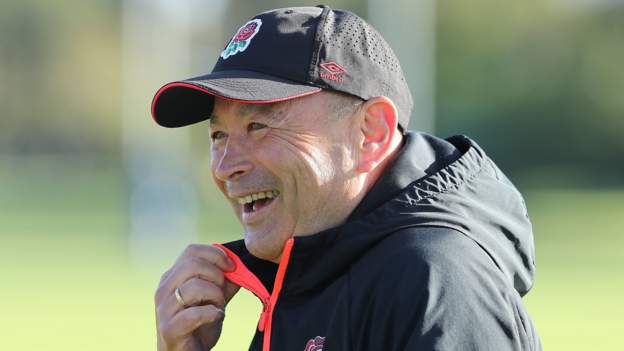
Before the first Test against Australia last Saturday, England boss Eddie Jones was in confident mood.
"We haven't had the opportunity to pick a side like this for a long time," he said buoyantly.
But despite being in a position to win the game against 14 men, England crashed to a 30-28 defeat after a second-half Wallaby onslaught - a fourth loss in six Test matches in 2022.
Jones has responded by ringing the changes in the backs for Saturday's must-win second Test in Brisbane.
Of the three rookies he has selected, Guy Porter and Tommy Freeman are debutants and Jack van Poortvliet has just a handful of Test rugby minutes from the bench.
All three are exciting players who have impressed at club level, but at the same time he is ripping up his backline, Jones has espoused the need for consistency - citing a lack of cohesion as a factor behind the side's regular final-quarter collapses.
"The more you play together, the more you create new habits, the more chance you have of working together under pressure," Jones told the Rugby Union Weekly podcast.
"This is the classic case of a newish team finding their way."
England fans can be forgiven for feeling confused. The side has been stuck in a rut since the 2019 World Cup, and Jones has talked about "development" and a "new team" for much of the past three years.
New players have come, and gone. Experienced players have gone, then come again. The identity and style of the team is hard to pinpoint.
While Jones is desperate to develop Marcus Smith's partnership with Owen Farrell, they are very different players, with Smith part of a free-wheeling Harlequins outfit and Farrell running a more prosaic Saracens side.
In Perth, Smith's club-mate Danny Care started at scrum-half, but he now drops to the bench with Van Poortvliet coming in.
"It's hard for me to understand what they are trying to do, with Danny Care, Marcus Smith and Owen Farrell," former England player Chris Ashton told Rugby Union Weekly.
"It is in the middle, I think, in terms of style. Owen has an opposite style [to Care and Smith] as we saw from Saracens and Harlequins in the Premiership semi-final; they are polar opposites.
"So how do you just expect it all to work together? I don't know how."
Results have been consistently inconsistent. There are mitigating circumstances, according to Jones, with Covid and the Saracens salary cap scandal both contributing to the malaise.
"It's been a difficult period," he said.
"Saracens' relegation definitely affected the team quicker than I thought it would. I thought we would have a more sequential plan and transition to a new team, whereas we have had to be a bit more deliberate in making some more aggressive changes."
But when do supporters tire of the excuses? How long can poor performances be explained away as all part of the process leading up to the 2023 World Cup?
"I believe we are making good steps - and we will see that on Saturday," Jones said.
"For me, it is all part of the process. I was offered - and decided to take - this task on of rebuilding the team. I am enjoying the task, and I don't feel any additional pressure than I did when I coached the first game for England, or the second game, or the third, or the fourth.
"The pressure is always there. And if I didn't like the pressure I wouldn't be in the job."
Jones has been here before.
In 2018, his job was on the line after a poor Six Nations and two defeats in South Africa. England dogged out a 25-10 win in the third Test in Cape Town, and 16 months later they were in the World Cup final.
"We are one kick or one tackle or one pass away from being a very good side," said Jones. "That will come on Saturday."
Whether that is a realistic outlook or blind faith, England fans - and those in power at the Rugby Football Union - will be desperately hoping he is right.















 Phone: (800) 737. 6040
Phone: (800) 737. 6040 Fax: (800) 825 5558
Fax: (800) 825 5558 Website:
Website:  Email:
Email: 






